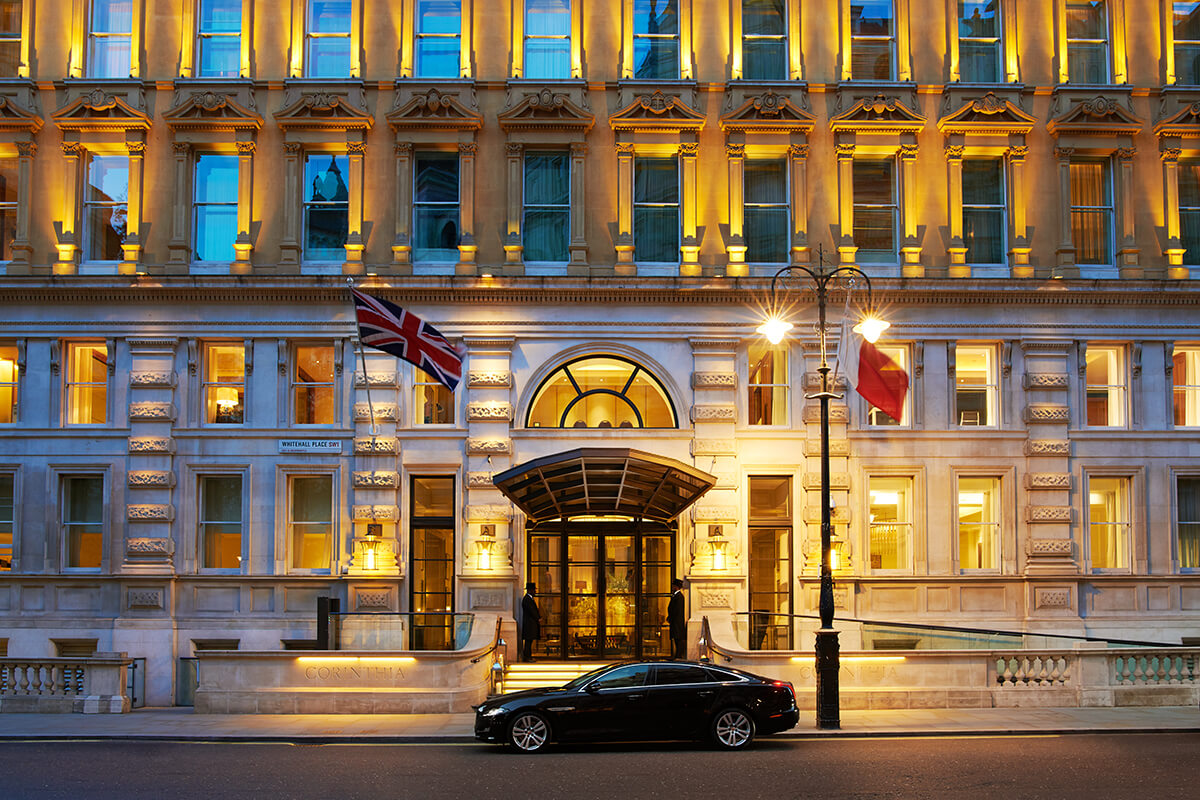
The entrance to the Corinthia Hotel in Westminster, London
Under the leadership of Alfred Pisani, Corinthia Hotels has grown from a single family-owned banquet hall in Malta to a global luxury brand with properties in 9 destinations and forthcoming openings in Dubai and Brussels. LUX speaks to the Maltese businessman about the challenges he’s faced, his guiding principles and the importance of creating a strong employee culture
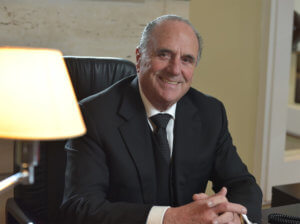
Founder & Chairman of Corinthia Hotels, Alfred Pisani
LUX: You developed one of the first deluxe hotels in Malta on your family’s estate. Can you tell us about that story?
Alfred Pisani: It’s a long story but I’ll try and abbreviate. Basically, I was not planning to become a hotelier. My interests when I was at college were mathematics and science; a very logical style of thinking, which I think is very important to our life anyway. My father had just bought a beautiful, majestic villa with some 20,000 square metres of land and wasn’t quite sure whether we were going to live in it or he was going to do business in it. Unfortunately, he passed away four months later, and suddenly, together with my brothers, I had the responsibility of deciding what to do with this property. The place had not been lived in for a number of years and obviously deterioration had taken place, so our first step was to try and put that right. I went to the bank and got a loan, which my uncle supported me with in terms of security, and we first started using this magnificent hall for receptions and weddings, parties and so on.
Follow LUX on Instagram: the.official.lux.magazine
Then one day someone came along and said, ‘Why don’t you provide the catering as well?’ so we brought in an outside caterer to help us with that request. After that, we organised a proper kitchen, and then we opened our own restaurant. Two years down the line, there was a big drive from the government to give incentives to entrepreneurs, as the country was changing the economy from one totally dependent on a naval and military base (as the English were pulling out), to one where we would have industry and tourism, to create a new economy. So I applied, and I went with my own drawing of a forty-room hotel to the appropriate ministry, but we were told we wouldn’t qualify unless we had a minimum 150 rooms.
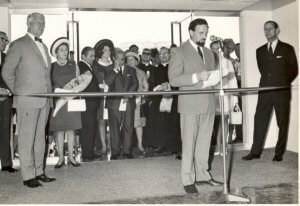
The opening of Corinthia Palace in Malta, 1968
A few weeks later, I went back with an elongated hotel with 156 rooms. And the guy said to me, ‘So you have money for 40 rooms, but do you have room for 156?’ I said, ‘Well, no, but the bank does. They’re going to give us the money.’ He was amused, but I still went through the motions. I went to one bank, and then another, and then another, and eventually I found one large enough to handle the job. The same question was asked about our equity, and I told them the equity was the building, the ground and our effort. We got 100% funding, and this is something I’m still proud of today. That was unheard of then. But I assume the timing was part of the whole success; there was a tremendous push to bring in foreign currency and to create a new industry.
Then when I came to build the hotel, I found the local contractors were very busy and too expensive, so I decided I’d be the contractor. I actually employed people from the street – literally. And I’ve never built a hotel as fast as that. Never. Today I keep saying to everybody, ‘We do so many drawings that we’d have enough paper to build a hotel out of it.’ But obviously things have become very much more complicated with all the electronics and everything. It’s quite remarkable, though, what one can do when one is determined. I remember buying a second-hand mixer to do the concrete, and we would throw in the aggregate, the sand and the cement and I’d hold a pipe and I’d look it and say, ‘Hmm, yes, the consistency looks right, let’s pour.’
Read more: New luxury hotel Chais Monnet opens near Bordeaux
You know, it’s remarkable with what you can do with nothing. We would work from 6 o’clock in the morning until about 11 o’clock at night, day in, day out, for around two years. And then we opened and it was successful. Again, there were coincidences that helped us along the road and we took the opportunities. Some decisions were very difficult to make in terms of bringing in new partners and going from one playing field to a more advanced one with new shareholders and new standards. And you have to remember that we didn’t have a home market. The banks couldn’t come aboard with us, because they just didn’t have the capital to do that. So, each time we went to an outside destination we’d have to talk to banks who didn’t know us. That didn’t make it easy. You really had to prove yourself. And you had to appoint new architects too. This was what I found most difficult. If you got your first step outside your island wrong, it would just knock you out. So you couldn’t afford to get it wrong. At that time, I didn’t think like that: I just went and went and went. I never had a doubt in my mind. I suppose that’s the beauty of youth, when you are full of enthusiasm and determination but you are limited in your expertise and experience: that combination worked well for us.
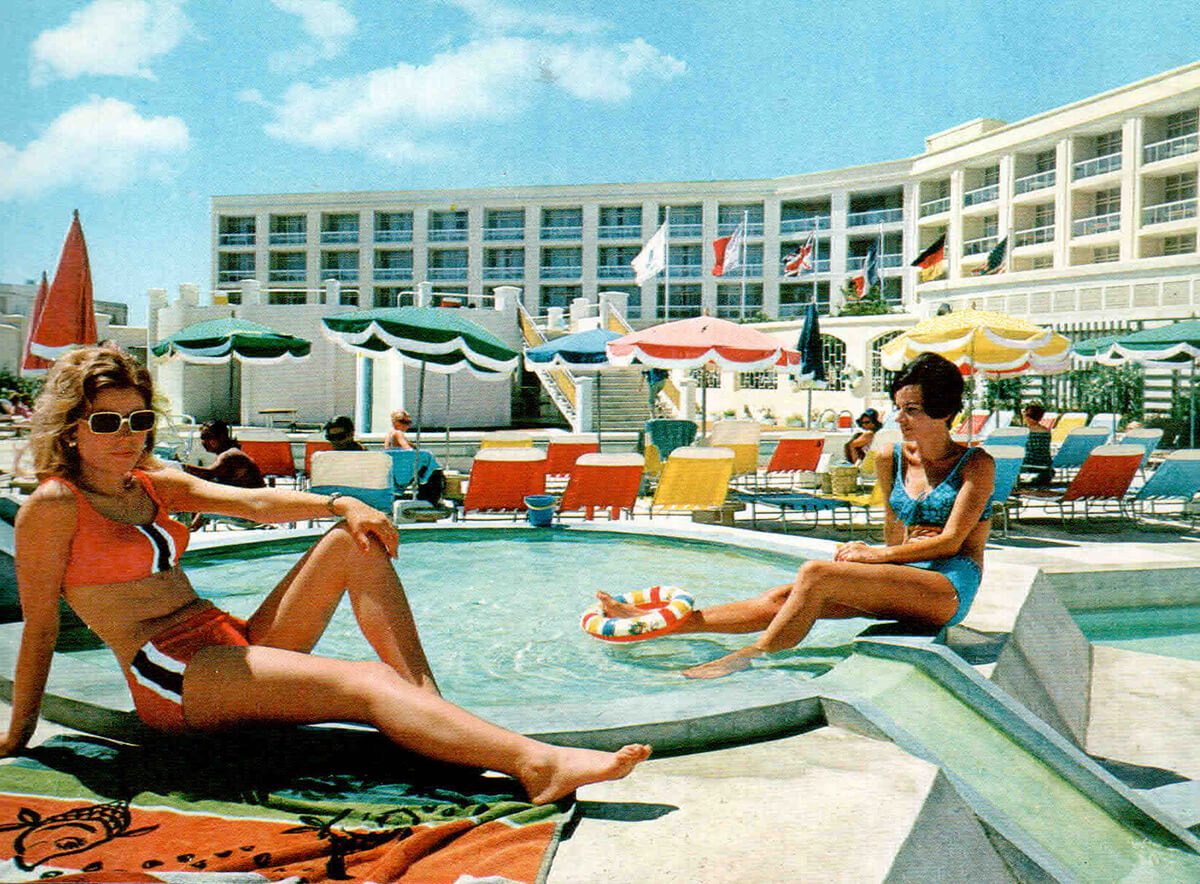
Ladies enjoying the pool at Corinthia Palace, Malta in 1968
We have always focused on trying to achieve the best. I don’t think in the early days we gave more importance to visibility as to the quality. I have a strong conviction that quality will win the day. You have to get every step right and then the results will be right. I had a natural tendency to focus on the details and trying to get everything right with the strong belief that that was ultimately what would produce the results I wanted. We don’t have a real measure. I used to say, ‘If I sow one hundred seeds, ninety-five will grow, because that’s part of nature.’ So as long as you move with the current of nature, the results are going to be further growth. There were these very strong principles from a very early stage, and I was constantly trying to share my beliefs and direction with everybody else.
LUX: What do you think sets the Corinthia apart?
Alfred Pisani: Well, today, after so many years of growing a hotel out of a very small country, we have brought another element into our consideration. Not only do we believe in ‘doing it right’ in order to generate a positive return, but we’ve gone one step further by saying we want to “uplift lives”. It will probably take a long time to appreciate what I’m trying to say; I didn’t think like this when I was younger, but it’s something people get to eventually. If you want a more productive outcome from your colleagues – I don’t like to call them employees – you must identify a sense of caring. If you share your knowledge, give a helping hand and show respect, this creates a more committed work force, where everybody is aligning the energy. It’s just like in a magnet: when you align all the atoms instead of having them in disarray, you create a magnet. Simply by infusing a sense of discipline and purpose, you can align everyone’s energies to think in the same direction. You create an energy where, like a magnet, though you can’t see it, you can sense it.
So, from being totally focused on wanting perfection, it has translated itself over the years into saying how can you make everyone within the family more successful as an individual? You must sleep well, eat well, socialise – work is just another aspect of this holistic responsibility. If you can get your engine to be firing correctly on all cylinders, you just get your efficiency a bit higher; you fine tune it. That’s what I think sets Corinthia apart. We have a very close interaction with our personnel. We call it the family. I truly say this with all sincerity: people who have come to the company, and even those who leave the company, will always remain Corinthians. They will always show respect. I say this with a lot of conviction and satisfaction.
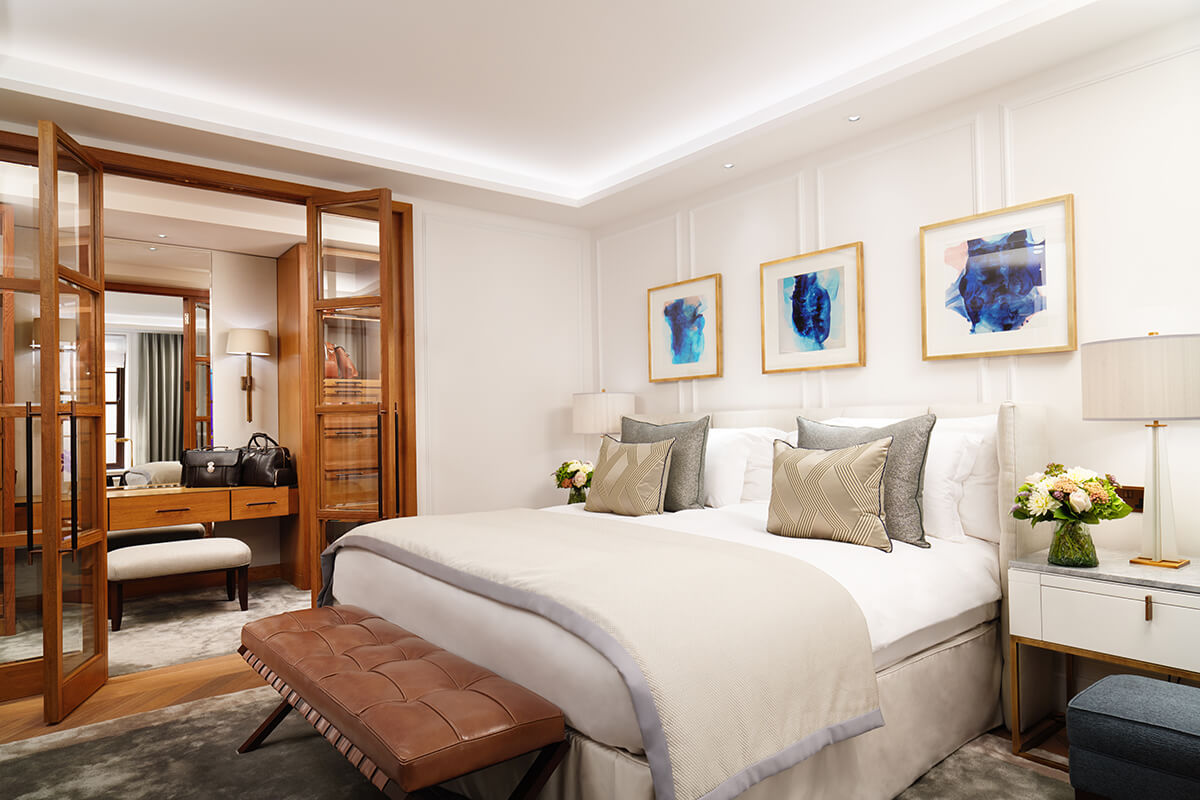
A suite at the Corinthia Hotel in London
LUX: We’ve been discussing your properties in Malta – is that your biggest market?
Alfred Pisani: If we go back to when I opened my first hotel in 1968, at that time, with Malta still having a semi-colonial relationship with Britain, all we knew was the UK. We bought everything from the UK, right down to the smallest screw. Our tourism came from the UK, I would say 99%. There was no corporate business because there was no business. People came mainly in summer. Their stays would be long stays – one or two weeks – and it was all handled by tour operators, who distributed the brochures and displayed the hotel across the UK. They would come over in August and agree the rates for the following year. Everything was agreed a year in advance.
Read more: Luxury watch designer Richard Mille on creativity and supercars
Over the years the government and hoteliers realised that it was necessary to diversify for the future and effort was put into marketing it in Europe. And this has, over the years, mainly succeeded, because now we have visitors from all over. Possibly Britain is still number 1. I think it’s a healthy situation to arrive at. When we came to open in London, we knew what the story was. In the five-star business, you had the home market and the United States. So we made a big effort in the United States to win our share of the five star business coming to London, competing against all the other well-known brands, who have been there for a very long time. I think we did very well in penetrating the market in the space of two or three years.
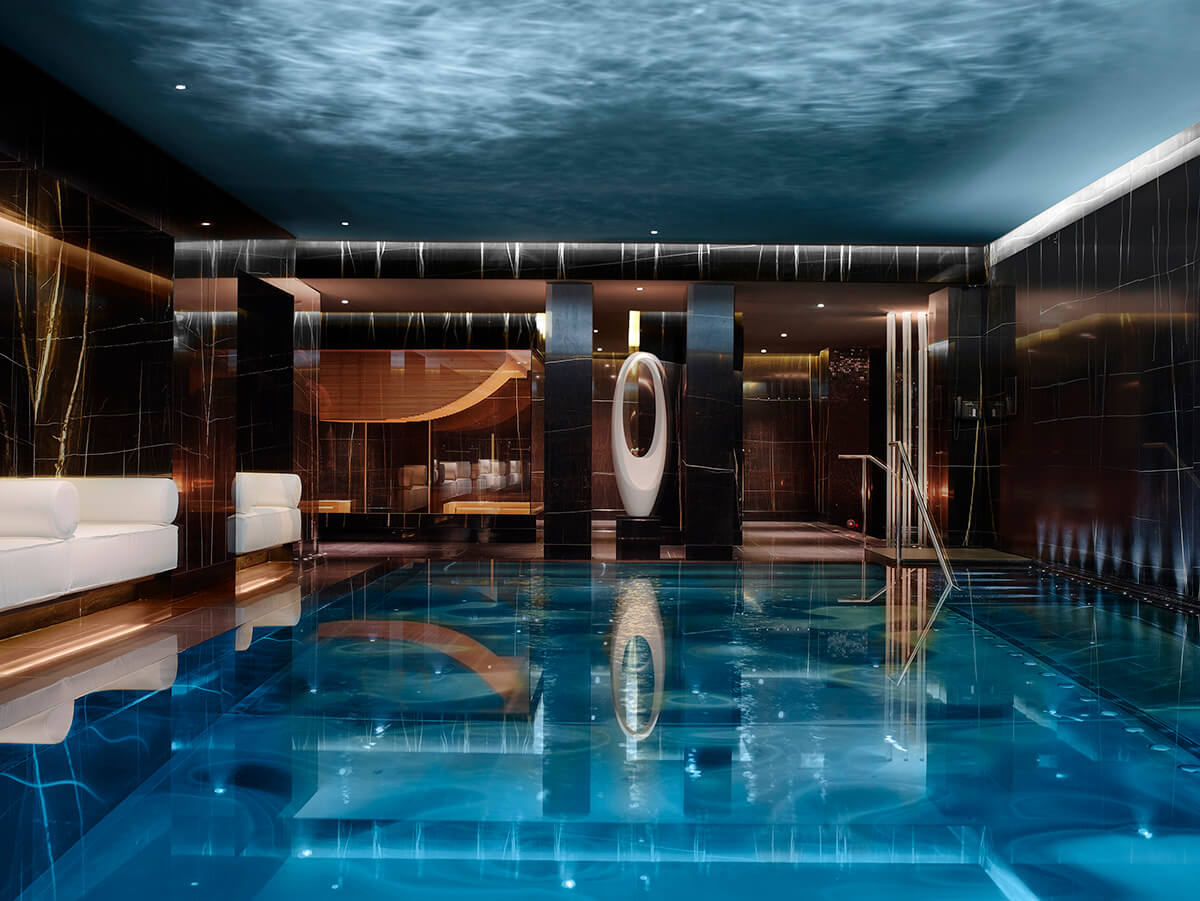
The Pool at ESPA, Corinthia London
LUX: What’s the biggest challenge in investing in other countries?
Alfred Pisani: As I said earlier our bankers, our lawyers, our everything could not move with us. We had to look for destination where their business had a similarity to us such as resort businesses, holiday businesses, and where it was not too expensive that we could not afford it. I couldn’t dream of coming to London or New York so to begin we built five hotels in Turkey and because I didn’t feel confident enough I looked for Turkish partner.
After 1990 when there was the dissolution of the Soviet Union, tremendous opportunities were available in Russia and all the Eastern European countries came by cheaply. Now, we were, I think, even ahead of the banks! We went into St Petersburg and Budapest and so on and they were good opportunities. We visited every single east European country that had now opened, but what I didn’t have, because I don’t think we were wise yet or we didn’t have the reputation yet, was funding and support from a consult team of banks and institutions which was somewhat of a handicap because the opportunities I met were tremendous.
Read more: The Secret Diary of an Oxford Undergraduate
LUX: And you’ve got properties opening in Brussels and Dubai?
Alfred Pisani: We bought the property in Brussels so that belongs to us, but in Dubai we are purely in management. We will run our flag on one of the most beautiful hotels to be built in Dubai and it will be Corinthia, but we are not the owners. We have supported it in the designs – it will be stunning and it’s set to open in 2020.
In the meantime, we have been operating two other properties on behalf of the same company, the Meydan Group. They have the Meydan Hotel which has big horse racing track and all of the bedrooms overlook the track. It’s a very successful property and we have seen tremendous increase in the bottom line since we took over, together with another hotel which they own in the desert called Bab Al Shams. So, apart from investing in our own properties I think now we have a brand that is visible enough and that is providing good enough standards to also offer it to third party owners and hopefully expand our brand in many more hotels without necessarily putting in capital.
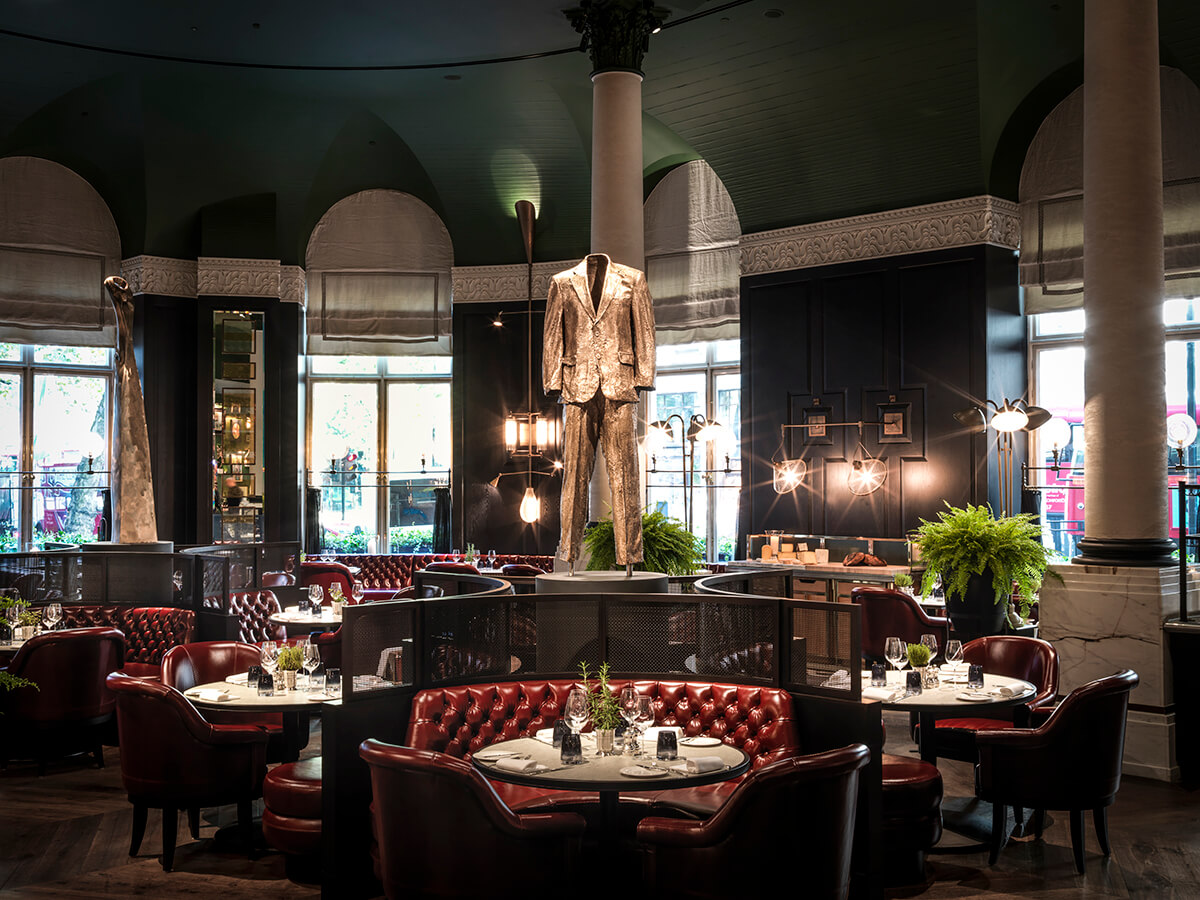
The restaurant at Corinthia London, headed by Michelin-starred chef Tom Kerridge
LUX: What’s the hardest lesson you’ve had to learn?
Alfred Pisani: I think the lesson I learnt was a confirmation of the conviction I already had to do everything properly and that by doing everything properly, you stood a much bigger chance of success, as opposed to taking shortcuts. We kept to this principal and we would never get involved with political parties in countries. What I realise today, which I didn’t realise at the time, is that I think we were right in the way we negotiated and I don’t think I would change it if I had to do it all over again. My advice to those who are still starting is keep on the straight.
LUX: Do you see a difference in what younger and older travellers expect from luxury?
Alfred Pisani: Yes, there has been a change of expectations from the customers in terms of the hardware, for example, bathrooms. However, the basic ingredients that they look for haven’t changed. Are you welcomed with a smile that is genuine and not plastic? Do you truly, collectively, radiate an energy of positiveness, which makes the customer feel good even though he cannot put his finger on it? Those elements haven’t really changed that much. I don’t know whether in a number of years to come whether we will be interacting with one another in a deeper way by the development of our intellect, the telepathy, the ability to feel and sense each other in a stronger way with the support of electronics… That’s the future.
LUX: And what about the future of Corinthia Hotels?
Alfred Pisani: Growth. I am sure that the principles that we have worked with will be maintained and the new phrase that was created recently in our last general managers’ meeting in Brussels: “uplifting lives”. That phrases encompasses how we want to continue helping our colleagues to grow and become better people.
Discover Corinthia hotels: corinthia.com

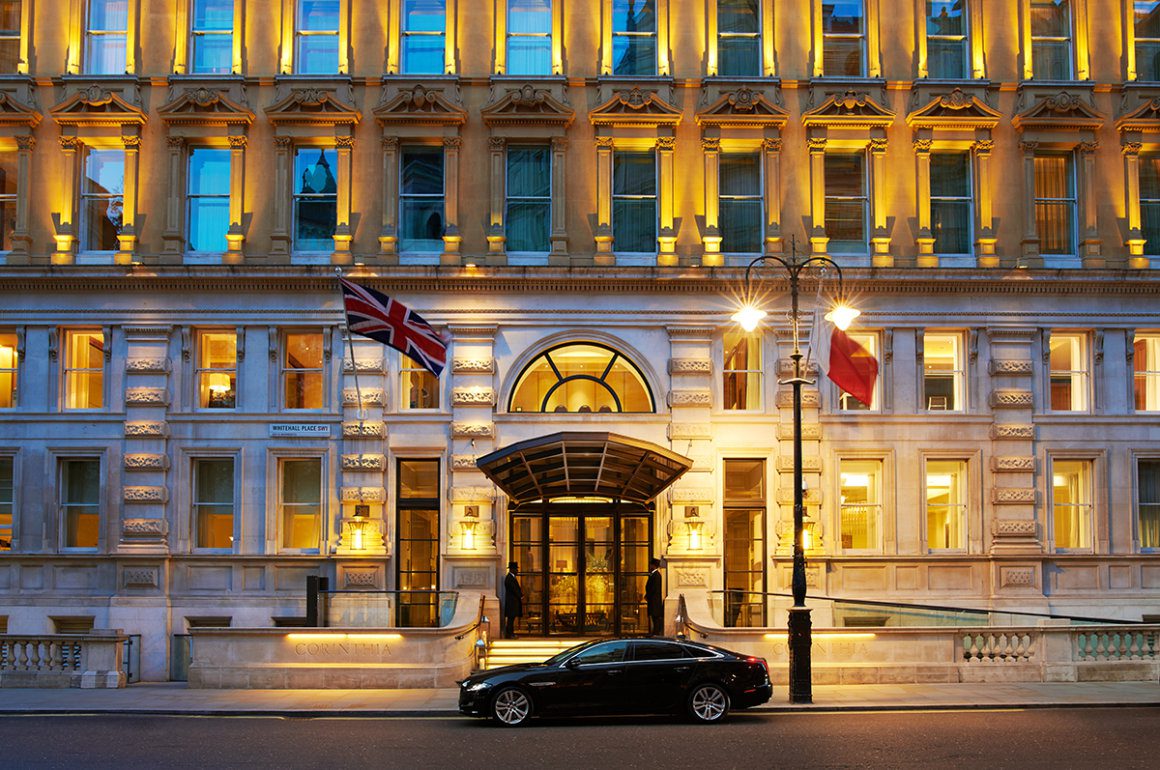




Recent Comments